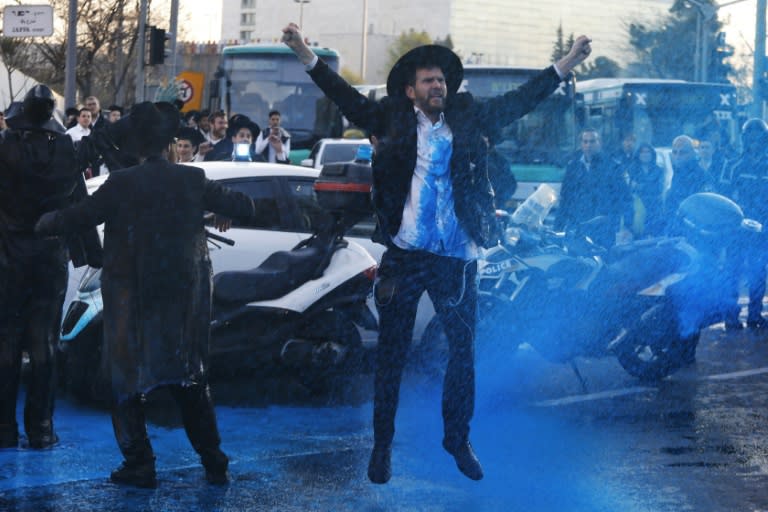Israel ruling on army service for religious sparks anger, debate
An Israeli Supreme Court decision that could force ultra-Orthodox citizens to serve in the army like their secular counterparts sparked anger from religious leaders Wednesday and reignited a sensitive political debate. Tuesday's decision strikes down a law exempting ultra-Orthodox men engaged in religious study from military service, saying it undermines equality. The decision raises the possibility that they could be forced into service, a highly contentious proposition with political implications. The court however suspended its decision for one year to allow for preparations for the new arrangement -- which also provides the government with the opportunity to pass a new law. Ultra-Orthodox political parties and their allies in government are likely to draft new legislation that could seek to override the court ruling and keep the exemption in place. The ultra-Orthodox parties form a key part of Prime Minister Benjamin Netanyahu's governing coalition and have often acted as kingmakers in Israeli politics. Around 10 percent of Israel's eight million people are considered ultra-Orthodox. Health Minister Yaakov Litzman, whose ultra-Orthodox United Torah Judaism alliance is part of Netanyahu's coalition, accused the court of seeking to topple the coalition. He called the ruling "one of the worst, most wretched judicial decrees that will enter the long history of persecutions of the Jewish people," ultra-Orthodox newspaper Hamodia reported. Interior Minister Aryeh Deri, of the ultra-Orthodox Shas party, said "the Supreme Court is totally cut off from our (Jewish) heritage and tradition." The issue is part of a decades-old debate over whether young ultra-Orthodox men studying at seminaries should perform mandatory military service like the rest of Israel's Jewish population. After reaching age 18, men must serve two years and eight months, while women must serve for two. In 2015, lawmakers passed legislation extending their exemption from duty, reversing a law passed the previous year that would have seen it expire. Israel's first prime minister David Ben-Gurion initially granted the exemption in the early years of the state founded in 1948, which at the time involved only 400 students. The ultra-Orthodox are however today among the fastest-growing segments of Israel's population, with projections that they could account for one-quarter of the total by 2050. - 'Not just for suckers' - They oppose serving for a variety of reasons, with the most extreme believing a Jewish state is not allowed before the coming of the Messiah. Others argue that yeshiva study is just as important to Israel as military service or that ultra-Orthodox soldiers would be confronted with salty language and other unreligious behaviour. Yair Lapid, the head of the centrist Yesh Atid party who pushed to remove the exemption as part of the previous government in 2014, welcomed the court's decision as a victory of "values." Lapid, now in the opposition, also criticised Netanyahu, saying the prime minister could not continue to avoid the issue and that "conscription is for everyone, not just for the suckers who don't have a party in the coalition." Israeli media reported that the ultra-Orthodox parties were to meet on Wednesday to plot a way forward after the decision. But many analysts said it was unlikely to provoke a coalition crisis, with Netanyahu having sided with the ultra-Orthodox parties on a range of issues recently. A decision in June to scrap a deal to allow women and men to pray together at the Western Wall provoked heavy criticism of Netanyahu, who was accused of abandoning reform efforts for political gain. The ultra-Orthodox parties bitterly opposed the deal for mixed-gender prayer at the site in Jerusalem, the holiest where Jews are allowed to pray, since it violates their strict interpretation of Jewish law. "Let's put matters in proportion. This is not a political earthquake, not at this stage," political columnist Ben Caspit wrote in Israel's Maariv newspaper. "Almost nobody has the energy for elections at the moment."




